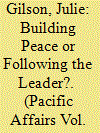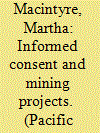|
|
|
Sort Order |
|
|
|
Items / Page
|
|
|
|
|
|
|
| Srl | Item |
| 1 |
ID:
078538


|
|
|
|
|
| Publication |
2007.
|
| Summary/Abstract |
This paper seeks to analyze the potential for violent conflict in the Republic of Vanuatu, a small island state in the South West Pacific. It examines the likelihood of state level conflict and investigates local factors which might contribute to state destabilization. It seeks to redress the relative absence of Pacific conflicts from the international discourse on conflict and conflict prevention.
We argue that while Vanuatu possesses indicators of potential conflict, when violent conflicts have arisen in Vanuatu they have remained small scale and rapidly contained. In exploring this phenomenon, the paper charts factors such as formal and informal dispute resolution mechanisms, ethnic diversity, the availability of small arms and the incidence of violent crime. However, we note that strategies aimed at preventing the outbreak of violence may potentially create policy conflicts with other areas. In particular, we look at the effects of indigenous dispute resolution strategies on gender empowerment, one of the United Nation's Millennium Development Goals and a central premise of Australian Official Development Assistance to Vanuatu
|
|
|
|
|
|
|
|
|
|
|
|
|
|
|
|
| 2 |
ID:
078536


|
|
|
|
|
| Publication |
2007.
|
| Summary/Abstract |
In Japan, debates about the nature of peacekeeping contributions continue alongside questions regarding the relevance of Japan's constitution in the twenty-first century and the political implications of aid disbursement. This article seeks to illustrate how both Official Development Assistance and peacekeeping operations are being linked through Japan's "peace consolidation diplomacy." For historical reasons, the Japanese government has been unable to play a traditional peacekeeping role. At the same time, Japan's position as leading aid donor has received negative feedback from a recession-bound populous that now views key recipient countries as competitors rather than needy neighbours. As a result, issues pertaining to humanitarian intervention, peacekeeping and aid provision frequently overlap, as Japan searches for a means of playing a constructive international role commensurate with the expectations of the rest of the world and with Japan's own claim for a place on the permanent UN Security Council. This article examines Japanese debates surrounding the sending military personnel to crisis areas and the changing provision of aid, against a background of changing concepts of humanitarian intervention, peacekeeping and assistance. It illustrates how hte Japanese government utilizes a combined narrative of peacekeeping, humanitarian intervention and aid giving, in order simultaneously to soften the public response to sending peacekeepers and to respond to increasingly targeted international demands for a more substantial Japanese contribution to conflict resolution.
|
|
|
|
|
|
|
|
|
|
|
|
|
|
|
|
| 3 |
ID:
078535


|
|
|
|
|
| Publication |
2007.
|
| Summary/Abstract |
This paper examines the regional environmental co-operation in East Asia at the local government level, focusing on the intercity environmental co-operation between the two cities in Japan and China-Kitakyushu and Dalian-as a case. Theoretically, this case demonstrates the dynamic nature of local government level environmental co-operation in the sense that all the three levels-government, local government, and private-are closely interconnected, and the major actors-the firms-play a role in shaping the outcome of intercity co-operation. Also, in terms of policy implication, this case is important not just for East Asian but also global environmental politics because it is the co-operation between cities in China and Japan-the two most important countries in East Asia that affect regional and global environmental protections efforts seriously. In order to investigate the reasons of success, and the dynamic nature of intercity environmental co-operation, this paper suggests a framework for analysis on the relationship between multiple dimensions of regional environmental co-operation, and then, examines the historical process and the details of the case and explains why this case has been remarkably successful and produced significant outcome. Finally, it draws some theoretical as well as policy implications of this case in terms of possibilities for and limitations of East Asian regional environmental co-operation in the future.
|
|
|
|
|
|
|
|
|
|
|
|
|
|
|
|
| 4 |
ID:
078537


|
|
|
|
|
| Publication |
2007.
|
| Summary/Abstract |
Free, prior and informed consent is increasingly perceived as a means of ensuring that people's human rights are respected and their interests protected. This paper explores issues arising in the context of gaining informed consent about mining projects from people who are citizens of a developing nation. Assumptions about rights, processes of negotiation, scientific knowledge and environmental degradation are often alien to the local people involved. Drawing on anthropological research in Papua New Guinea, the complex interactions between understandings of scientists, environmentalists, corporation managers and indigenous people are examined. The pragmatic problems of ensuring that informed consent is gained and that the human rights of local people are equitably protected are explored and some tentative solutions offered
|
|
|
|
|
|
|
|
|
|
|
|
|
|
|
|
|
|
|
|
|